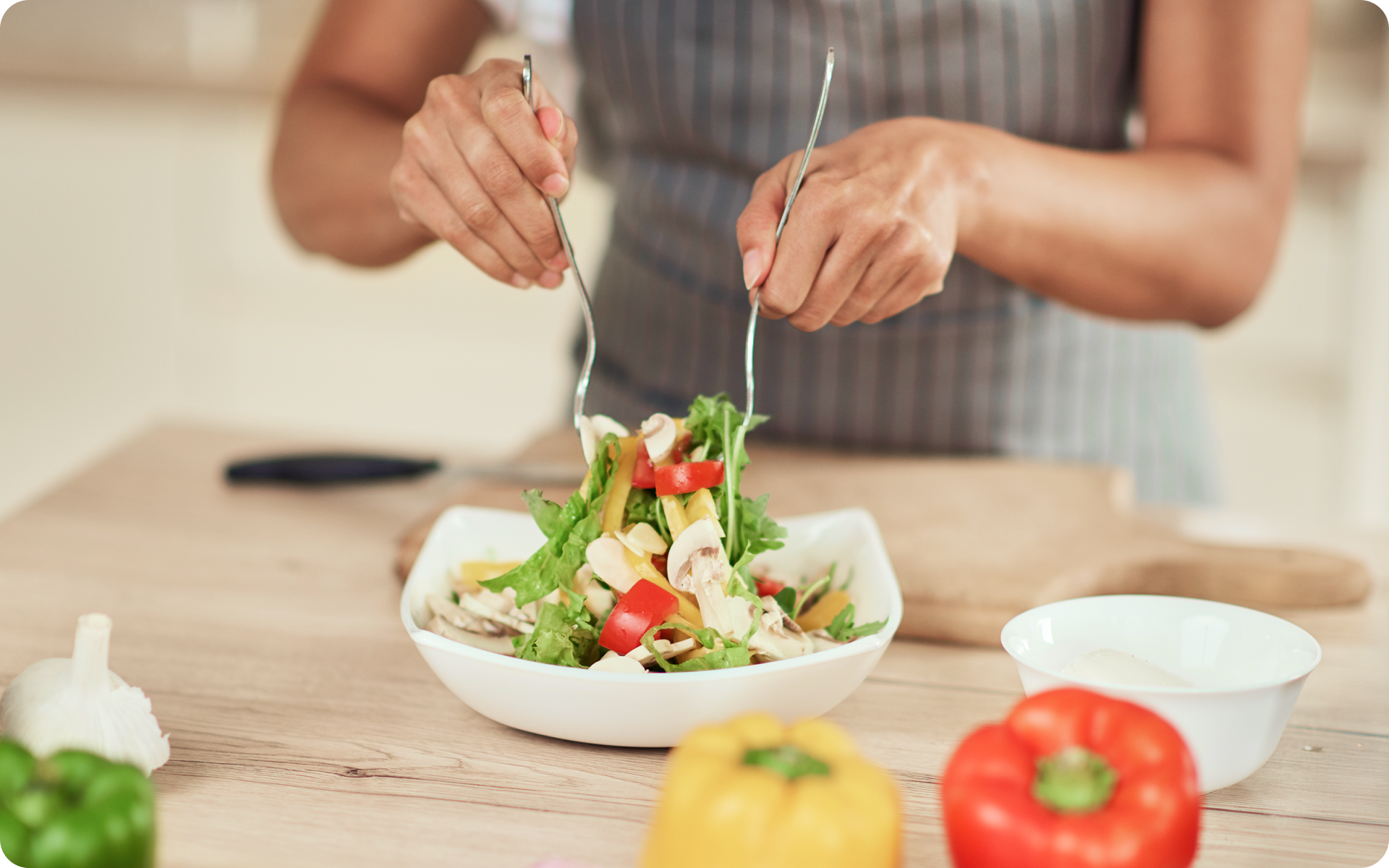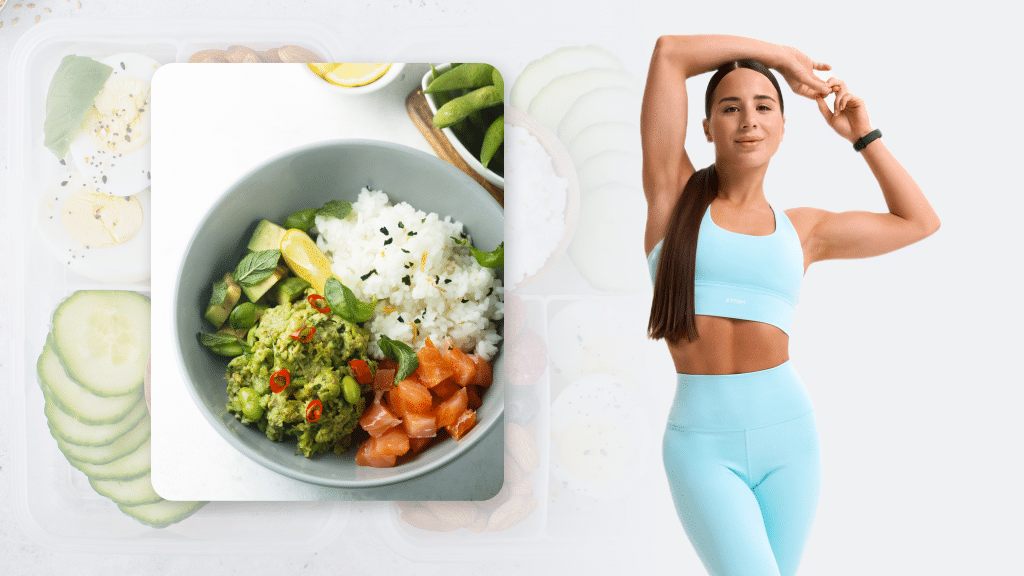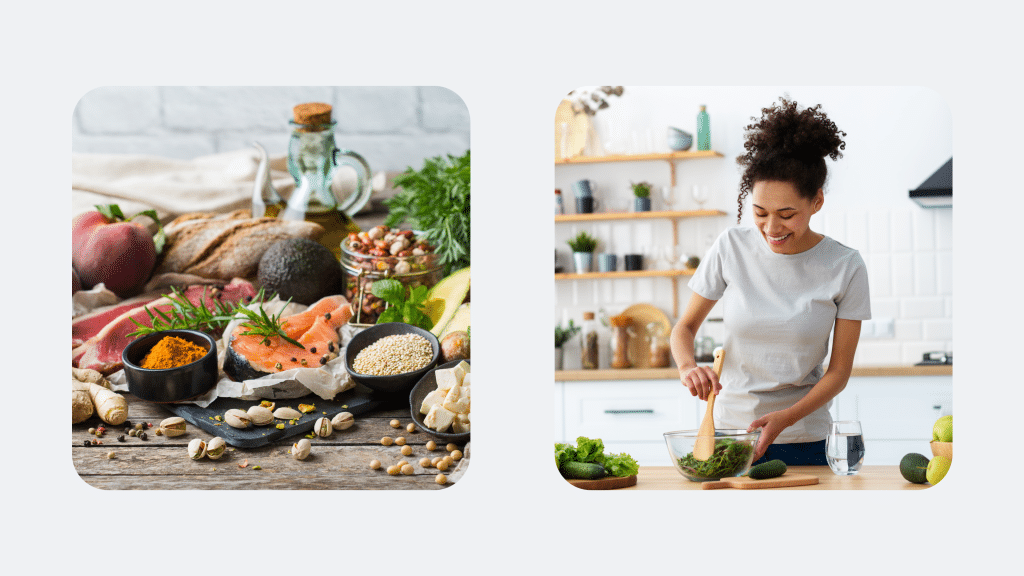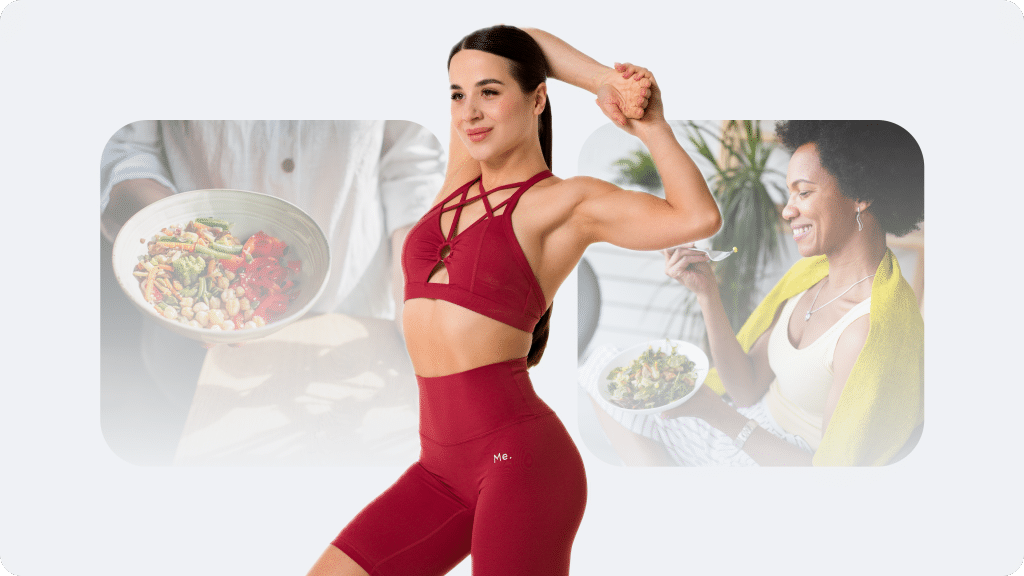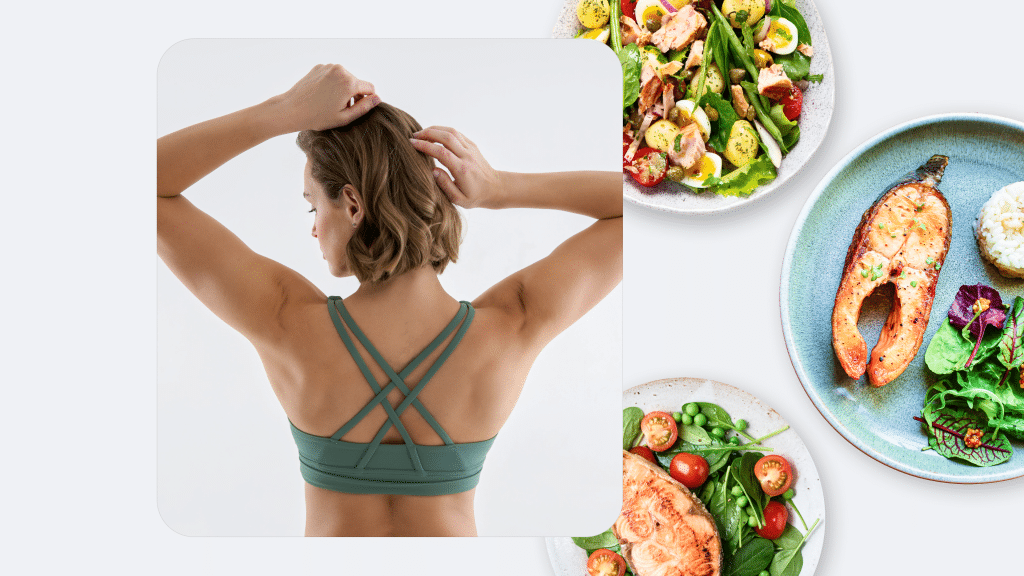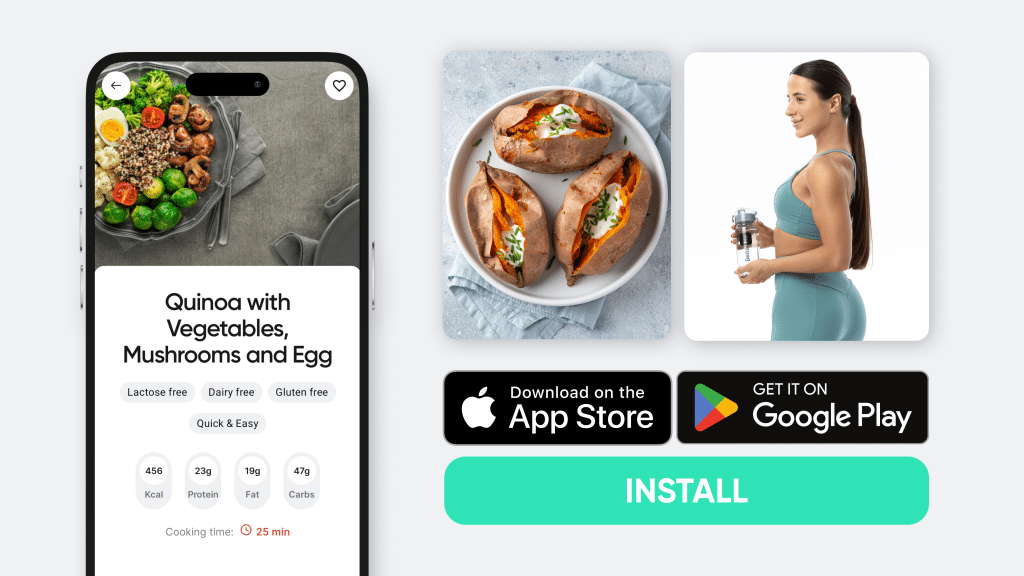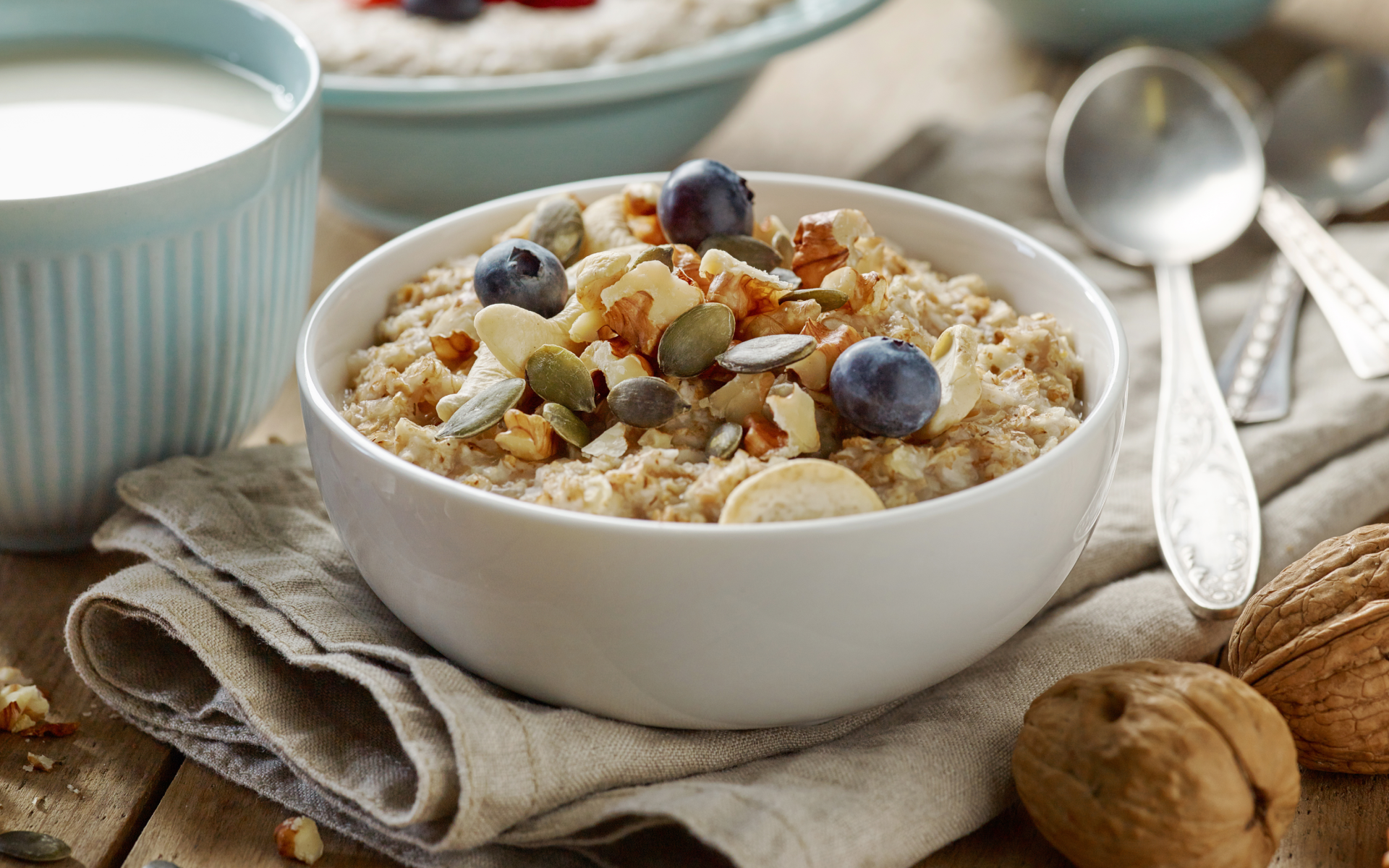2,700 calories may seem like a lot, but when you’re trying to bulk up and gain muscle mass, it’s important to consume enough calories to fuel your workouts and promote muscle growth.
Consuming fewer calories than your body needs may have more than just an impact on your weight. It can also cause fatigue (making it harder to exercise), in addition to deficiencies in important nutrients and vitamins (1).
It’s common for people to turn to high-calorie, unhealthy foods when they’re trying to bulk up quickly. However, this can lead to an increase in body fat rather than muscle mass.
So, having a 2,700-calorie meal plan that consists of nutrient-dense foods is essential for a successful bulk. To help you reach your bulking goals, here’s a simple 2,700-calorie meal plan with snacks included.
What to Eat on a 2,700-Calorie Meal Plan
A good bulking meal plan should consist of a good balance of protein, carbohydrates, and healthy fats. Let’s look at the importance of these macronutrients and what foods are good sources of each:
Protein
Protein is essential for building and repairing muscle tissue (2). Aim to consume approximately 0.8-1 gram of protein per pound of body weight or approximately 25-30% of your daily calorie intake on a 2,700-calorie meal plan.
Excellent sources of protein include:
- Lean meats such as chicken, turkey, beef, and fish
- Eggs
- Greek yogurt
- Cottage cheese
- Tofu
Carbohydrates
Carbohydrates are the main source of energy for your body and play a vital role in fueling your workouts (3). They should make up approximately 45-55% of your daily calorie intake on a 2,700-calorie meal plan.
Healthy sources of carbohydrates include:
- Whole grains such as brown rice, quinoa, and oats
- Sweet potatoes
- Fruits and vegetables
- Beans and legumes
Read More: Meal Plan Balance: Tailoring Nutrition to Your Activity Levels
Healthy Fats
Contrary to popular belief, fats are not the enemy. In fact, they play an important role in long-term energy, hormone production, and muscle growth (4). Aim for approximately 25% of your daily calorie intake on a 2,700-calorie meal plan to come from healthy fat sources.
Healthy fat options include:
- Avocados
- Nuts and nut butter
- Olive oil
- Fatty fish such as salmon and tuna
Water
Staying hydrated is essential for overall health, particularly when you’re on a 2,700-calorie meal plan aimed at bulking. Water helps with digestion, nutrient absorption, and muscle recovery (5). Aim to drink at least 8-10 cups of water per day or more if you’re doing intense workouts that lead to significant sweat loss. In addition to plain water, you can include other hydrating fluids such as herbal teas and beverages infused with electrolytes, but make sure to be mindful of the amount of sugar these drinks can contain. This sugar will add to your daily carb intake, so remember to account for your drinks when counting your calories.
Vitamins and Minerals
In addition to macronutrients, your body needs a variety of vitamins and minerals to function optimally and support muscle growth (6). Here are some key vitamins and minerals to focus on in your meal plan:
- Vitamin D: Supports bone health and muscle function. Sources include fatty fish, fortified dairy products, and sunlight exposure.
- Vitamin C: Important for immune function and can help with muscle repair. It is found in citrus fruits, strawberries, bell peppers, and broccoli.
- B Vitamins: These vitamins, including B6 and B12, help with energy metabolism. Good sources include whole grains, meat, eggs, and dairy products.
- Calcium: Essential for bone health, which is important when engaging in strenuous workouts. Sources include dairy products, leafy green vegetables, and fortified non-dairy milk.
- Magnesium: Helps with muscle function and relaxation. It is found in nuts, seeds, legumes, and green leafy vegetables.
- Iron: Vital for oxygen transport in the blood. Sources include red meat, poultry, beans, and fortified cereals.
Foods to Avoid on the 2,700-Calorie Meal Plan
There are certain foods that should be avoided or limited on a 2,700-calorie meal plan for bulking. These include:
Sugary and Processed Foods
Foods that are high in added sugar and processed ingredients may provide a quick energy boost, but they can also cause blood sugar spikes and crashes, which can lead to fatigue (7). These foods, often found in snacks and convenience meals, are designed to taste good but lack important nutrients such as vitamins, minerals, and fiber.
Over time, relying on such foods can negatively impact overall health, contributing to issues such as weight gain, diabetes, and heart disease (7). It’s essential to prioritize whole, nutrient-dense foods to maintain stable energy levels and support long-term well-being.
Deep-Fried Foods
While healthy fats are beneficial for your overall well-being, foods that are deep-fried or high in unhealthy trans fats should be limited.
These types of fats can contribute to inflammation and weight gain, potentially leading to a range of health issues such as heart disease, diabetes, and chronic inflammation (8).
It’s important to prioritize healthier fat sources such as avocados, nuts, and olive oil in your diet to support optimal health and maintain a balanced lifestyle.
Alcohol
Alcoholic beverages add empty calories, which can contribute to weight gain, and hinder muscle recovery and growth by affecting protein synthesis and hydration levels. This can ultimately impact your overall fitness progress and performance (9).
Simple 2,700-Calorie Muscle Building Meal Plan
An effective bulking meal plan should be customized to suit an individual’s unique needs and preferences. With that in mind, here’s a basic 2,700-calorie meal plan that can serve as a starting point for those who are looking to bulk up:
Read More: 2200 Calorie Meal Plans for Steady, Long Term Weight Loss
Day 1
Breakfast (8:00 AM):
- Scrambled eggs (3 eggs) with spinach and tomatoes (~300 calories)
- 2 slices of whole-grain toast with avocado spread (~250 calories)
- 1 cup of Greek yogurt with a handful of berries (~150 calories)
Mid-Morning Snack (10:30 AM):
- 1 apple (~95 calories)
- 1 serving of almonds (approximately 23 almonds) (~160 calories)
Lunch (1:00 PM):
- Grilled chicken breast (6 oz) (~280 calories)
- Quinoa salad with mixed vegetables and a drizzle of olive oil (~300 calories)
- A side of mixed greens with a balsamic vinaigrette (~80 calories)
Afternoon Snack (3:30 PM):
- Cottage cheese (1 cup) with pineapple chunks (~200 calories)
Dinner (6:30 PM):
- Baked salmon (6 oz) with a lemon herb crust (~400 calories)
- Sweet potato (1 medium) with a dash of cinnamon (~100 calories)
- Steamed broccoli and carrots (~50 calories)
Evening Snack (8:30 PM):
- Whole-grain crackers with hummus (1 serving) (~150 calories)
- A handful of baby carrots (~35 calories)
Day 2
Breakfast (8:00 AM):
- Oatmeal (1 cup) topped with banana slices and a spoonful of peanut butter (~350 calories)
- A serving of hard-boiled eggs (2 eggs) (~140 calories)
Mid-Morning Snack (10:30 AM):
- Greek yogurt (1 cup) with honey and walnuts (~250 calories)
Lunch (1:00 PM):
- Turkey and avocado wrap (whole-grain tortilla, sliced turkey breast, avocado, mixed greens, and tomatoes) (~400 calories)
- A side of baby spinach salad with a light vinaigrette (~80 calories)
Afternoon Snack (3:30 PM):
- Sliced bell peppers with guacamole (~150 calories)
Dinner (6:30 PM):
- Grilled shrimp (8 oz) with whole-grain rice (~350 calories)
- Roasted Brussels sprouts and asparagus (~80 calories)
Evening Snack (8:30 PM):
- Cottage cheese (1/2 cup) with sliced peaches (~100 calories)
Day 3
Breakfast (8:00 AM):
- Protein smoothie (whey protein, spinach, banana, almond milk, and a tablespoon of chia seeds) (~300 calories)
- A slice of whole-grain toast with almond butter (~200 calories)
Mid-Morning Snack (10:30 AM):
- A handful of mixed nuts and dried fruit (~200 calories)
Lunch (1:00 PM):
- Tuna salad (tuna mixed with Greek yogurt, celery, and onions) on a bed of mixed greens (~300 calories)
- A side of quinoa and black beans (~200 calories)
Afternoon Snack (3:30 PM):
- 1 orange (~60 calories)
- 1 serving of mixed nuts (1/4 cup) (~200 calories)
Dinner (6:30 PM):
- Grilled steak (6 oz) with a side of barley (~400 calories)
- Steamed green beans and snap peas (~50 calories)
Evening Snack (8:30 PM):
- Greek yogurt (1/2 cup) with a drizzle of maple syrup (~100 calories)
Day 4
Breakfast (8:00 AM):
- Whole-grain waffles with fresh strawberries and a dollop of Greek yogurt (~350 calories)
- A glass of low-fat milk (~100 calories)
Mid-Morning Snack (10:30 AM):
- Protein bar (one with at least 15 grams of protein) (~200 calories)
Lunch (1:00 PM):
- Chicken Caesar salad (grilled chicken breast, romaine lettuce, Caesar dressing, Parmesan cheese, and whole-grain croutons) (~450 calories)
- One whole apple (~95 calories)
Afternoon Snack (3:30 PM):
- Celery sticks with peanut butter (~150 calories)
Dinner (6:30 PM):
- Baked tilapia (6 oz) with brown rice (~350 calories)
- A side of sautéed spinach and mushrooms (~80 calories)
Evening Snack (8:30 PM):
- Cottage cheese (1 cup) with cherry tomatoes (~150 calories)
Day 5
Breakfast (8:00 AM):
- Smoothie bowl (blended frozen berries, Greek yogurt, and almond milk) topped with granola and fresh fruit (~350 calories)
- A slice of whole-grain toast with a poached egg (~200 calories)
Mid-Morning Snack (10:30 AM):
- Apple slices with almond butter (~200 calories)
Lunch (1:00 PM):
- Beef stir-fry (lean beef strips, mixed vegetables, teriyaki sauce) with jasmine rice (~450 calories)
- A side of edamame (~100 calories)
Afternoon Snack (3:30 PM):
- A serving of trail mix (1/4 cup) (~200 calories)
Dinner (6:30 PM):
- Roast chicken (6 oz, with skin) with quinoa pilaf (~400 calories)
- A side of roasted butternut squash and kale (~100 calories)
Evening Snack (8:30 PM):
- Raw vegetable sticks (carrots, celery, and cucumber) with a tzatziki dip (~100 calories)
Day 6
Breakfast (8:00 AM):
- Whole-grain English muffin with scrambled eggs (2 eggs) and turkey bacon (~350 calories)
- A glass of orange juice (~110 calories)
Mid-Morning Snack (10:30 AM):
- Small protein shake (whey protein, almond milk) (~200 calories)
Lunch (1:00 PM):
- Grilled vegetable wrap (grilled vegetables, hummus, whole-grain tortilla) (~350 calories)
- A side of fresh fruit salad (~120 calories)
Afternoon Snack (3:30 PM):
- Roasted chickpeas (1/4 cup) (~120 calories)
Dinner (6:30 PM):
- Baked cod (6 oz) with a lemon garlic butter sauce (~350 calories)
- Whole-grain pasta with marinara sauce and lean turkey meatballs (~400 calories)
Evening Snack (8:30 PM):
- Sliced cucumber with cream cheese and smoked salmon (~150 calories)
Tips for Customizing Your 2700 Calorie Meal Plan
- Experiment with different healthy fats, lean protein sources, and complex carbohydrates to find what works best for you.
- Don’t be afraid to add high-calorie snacks or smaller meals throughout the day if necessary to reach your calorie goal.
- Stay hydrated by drinking plenty of water throughout the day. This can help your body feel more full between meals.
- Be mindful of portion sizes and serving suggestions – they can vary from person to person based on individual needs and goals. Just because a food is “healthy” doesn’t mean you can eat an endless amount of it.
- Keep track of your progress and make adjustments as needed. Everyone’s body is different, so it may take some trial and error to find what works best for you.
FAQs
Is 2,700 calories enough to lose weight?
Whether 2,700 calories is enough to lose weight depends on several factors, including an individual’s age, gender, weight, height, and activity level. Generally, for a very active person with higher calorie requirements, 2,700 calories could result in weight loss if this amount is less than their total daily energy expenditure (TDEE). Conversely, if 27,00 calories exceeds someone’s TDEE, they may not lose weight.
Is 2,700 calories too much for a woman?
For many women, 2,700 calories may be above their daily calorie needs, particularly if they lead a sedentary or moderately active lifestyle. The average calorie intake for women to maintain weight ranges from 1,800 to 2,200 calories per day (10). However, highly active women or athletes may require more calories to support their activity levels and maintain or build muscle.
What are the macros for a 2,700-calorie meal plan?
The macronutrient distribution for a 2,700-calorie meal plan can vary based on individual dietary preferences and goals. A balanced approach may consist of:
- Protein: 15-25% (approximately 100-170 grams)
- Fat: 25-35% (approximately 75-105 grams)
- Carbohydrates: 45-65% (approximately 305-440 grams)
Adjusting these ratios can help meet specific fitness or health objectives.
Which food has high calories?
High-calorie foods are typically dense in fats and/or carbohydrates. Examples include nuts and seeds, avocados, olive oil, cheese, and red meat. Processed foods such as pastries, candies, and fast-food items also tend to be high in calories, although they often contain less nutritional value. Opting for nutrient-dense high-calorie foods can be a healthier approach to increasing caloric intake (11).
Bottom Line
Tailoring your diet to meet a 2,700-calorie goal requires careful planning and consideration of individual needs and preferences. By incorporating a variety of nutrient-dense foods, staying mindful of portion sizes, and making adjustments based on your body’s responses, you can create a sustainable and enjoyable meal plan that supports your health and fitness goals. Remember, the journey to optimal health is unique for everyone and finding the right balance is the key to long-term success.
DISCLAIMER:
This article is intended for general informational purposes only and does not serve to address individual circumstances. It is not a substitute for professional advice or help and should not be relied on for making any kind of decision-making. Any action taken as a direct or indirect result of the information in this article is entirely at your own risk and is your sole responsibility.
BetterMe, its content staff, and its medical advisors accept no responsibility for inaccuracies, errors, misstatements, inconsistencies, or omissions and specifically disclaim any liability, loss or risk, personal, professional or otherwise, which may be incurred as a consequence, directly or indirectly, of the use and/or application of any content.
You should always seek the advice of your physician or other qualified health provider with any questions you may have regarding a medical condition or your specific situation. Never disregard professional medical advice or delay seeking it because of BetterMe content. If you suspect or think you may have a medical emergency, call your doctor.
SOURCES:
- Nutritional Status as a Mediator of Fatigue and Its Underlying Mechanisms in Older People (2020,nih.gov)
- Dietary Protein and Muscle Mass: Translating Science to Application and Health Benefit (2019,nih.gov)
- Fueling for Performance (2018,nih.gov)
- Why is protein, carbohydrate and fat important for athletic performance? (2018,msu.edu)
- Hydration to Maximize Performance and Recovery: Knowledge, Attitudes, and Behaviors Among Collegiate Track and Field Throwers (2021,nih.gov)
- Vitamins and minerals explained (2022,healthdirect.gov.au)
- Added Sugars (2024,heart.org)
- Trans fat is double trouble for heart health (2022,mayoclinic.org)
- The Effects of Alcohol on Athletic Performance (2017,nsca.com)
- Nutrition and Hydration Requirements In Children and Adults (2023,nih.gov)
- How Can I Eat More Nutrient-Dense Foods? (2023,heart.org)
